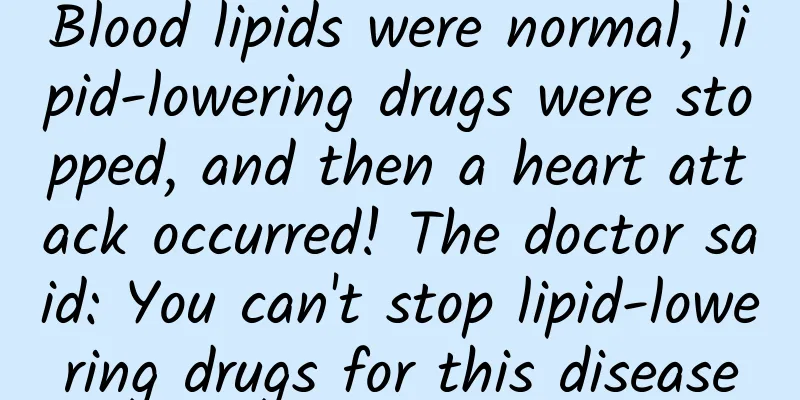Blood lipids were normal, lipid-lowering drugs were stopped, and then a heart attack occurred! The doctor said: You can't stop lipid-lowering drugs for this disease

|
At 4 a.m., when most people were asleep, Lao Fan got up to go to the toilet, but fainted on the floor as soon as he got there. His family members came over and helped him up. He was sweating profusely, his eyes were black, and he felt weak all over. The family members gave him some nitroglycerin to take sublingually, but Mr. Fan became more and more short of breath, so they quickly called 120. When the ambulance arrived, they measured the patient's blood pressure at 74/54 mmHg, indicating hypotension and shock. An electrocardiogram showed acute myocardial infarction, and the chest pain center and green channel were activated immediately. He was sent directly to the catheterization room, where angiography showed that a large blood vessel in Lao Fan's heart was completely blocked. After the blood vessel was opened, the patient's symptoms gradually eased, but he still had hypotension, so he was sent back to the intensive care unit with the help of pressor drugs. Outside the ICU, we explained the patient's condition in detail to the family again, telling them that the blood vessels had been unblocked and the risk had been reduced, but the patient was still not out of danger. Mr. Fan, 54 years old, was diagnosed with coronary heart disease three years ago. The doctor recommended long-term use of aspirin and statins, and instructed him to have regular checkups. After half a year, his blood lipids were normal, so he stopped taking lipid-lowering drugs. I asked the family why they stopped taking the medicine so casually? The family members said: At that time, the doctor said that statins can lower blood lipids. Half a year later, Mr. Fan’s blood lipids were normal when he was checked again, so we felt that there was no need to take it, and we also heard that statins are not good for the liver. I said: For coronary heart disease and all cardiovascular and cerebrovascular diseases, medications cannot be added or subtracted at will, or stopped at will. You must get the doctor's consent before adding or subtracting medications or stopping medications. It was the random discontinuation of the statin that led to this myocardial infarction. The family members were very confused: Why couldn’t they stop taking the lipid-lowering drugs even though their blood lipids were normal? They also said that stopping the lipid-lowering drugs was the main cause of myocardial infarction. 1. Statins are not lipid-lowering drugs, but lipid-regulating drugs Statins can lower total cholesterol, low-density lipoprotein, and triglycerides, which are bad blood lipids, so it is not wrong to say that statins are lipid-lowering drugs. However, statins can also increase high-density lipoprotein, which is a good blood lipid. Therefore, statins are strictly speaking lipid-regulating drugs, which can not only lower bad blood lipids, but also increase good blood lipids. Bad blood continuously produces blood vessel garbage, which aggravates atherosclerosis, further causing plaque aggravation and vascular stenosis; good blood lipids can clean blood vessel garbage, delay atherosclerosis, and prevent and control cardiovascular stenosis. The first major task of statins is to reduce bad blood lipids and increase good blood lipids, thereby preventing the aggravation of blood vessel garbage, cardiovascular stenosis, and controlling coronary heart disease. Let’s talk about hyperlipidemia, especially the main reason for the increase in total cholesterol and low-density lipoprotein is self-metabolism, that is, most cases of hypercholesterolemia require long-term medication control. Once the medication is stopped, these bad blood lipids will rise again, thereby producing more vascular waste again, aggravating atherosclerosis, causing plaques to worsen, and causing vascular stenosis. Therefore, statins are lipid-lowering drugs. Once they are discontinued, the cholesterol and low-density lipoprotein levels of most patients with hyperlipidemia will rise again, thereby aggravating cardiovascular stenosis. Therefore, for hypercholesterolemia, especially cardiovascular and cerebrovascular diseases, statins should not be discontinued casually. Second, the more important role of statins is anti-inflammatory and plaque stabilization The aggravation of atherosclerosis is the root cause of cardiovascular and cerebrovascular diseases. One of the reasons for the aggravation of atherosclerosis is the vascular garbage we mentioned above, that is, the accumulation of lipid substances in the blood vessels caused by the increase of low-density lipoprotein, which leads to the formation and aggravation of plaques. The second main reason is the inflammatory response in the blood vessels, which can also cause the aggravation of plaques. The aggravation of plaques will lead to vascular stenosis, and the rupture of plaques will form blood clots. The blockage of blood clots in the heart vessels is myocardial infarction. The second major, and even more important, function of statins is to fight inflammation and stabilize plaques, preventing plaque rupture, thereby preventing thrombosis and preventing myocardial infarction and cerebral infarction. From this point of view, even if blood lipids, cholesterol density, etc. are normal, statins should not be stopped, because statins are not only for lowering blood lipids, but also for anti-inflammatory and plaque stabilization, prevention of thrombosis, and prevention of myocardial infarction. 3. Which diseases cannot stop taking statins? For clear ischemic cardiovascular and cerebrovascular diseases, such as coronary heart disease, angina pectoris, myocardial infarction, post-stent surgery, post-bypass surgery, cerebral infarction, severe carotid artery stenosis and other vascular stenosis diseases, statins should not be discontinued casually. Because statins can not only reduce bad blood lipids and increase good blood lipids to prevent and control the aggravation of vascular stenosis, but also can fight inflammation and stabilize plaques to prevent and control the aggravation of vascular stenosis, and prevent thrombosis, myocardial infarction, and cerebral infarction. Unless statin allergy or severe muscle damage occurs during statin use, such as creatine kinase 10 times higher, or liver function is damaged and transaminase is more than 3 times higher, then reducing or stopping the medication will be considered. Otherwise, these diseases require long-term or even lifelong statin use. Lao Fan has had a heart attack and is in critical condition. If he knew that statin is not only a lipid-lowering drug but also a drug for preventing myocardial infarction, he probably would not stop taking statin so easily. There are too many ifs in life, and there are too many ifs in life, but there are no ifs in life... |
Recommend
Welcome to the colorful world of dizziness – vertigo and vertigo
Welcome to the colorful world of "dizzy"...
Breast pain, is it pregnancy?
Breast pain is quite common among women, and ther...
How to tell the front and back of dried squid? How to soak dried squid
Squid is a food from the seabed, so it has a very...
Is it better to take gynecological Chinese medicine before or after meals?
Due to their special physiological characteristic...
Scalp pain during pregnancy?
After women become pregnant, due to the continuou...
Can pregnant women eat water chestnuts?
It is autumn now, and it is the time when water c...
What are the effects of getting angry during menstruation?
The menstrual period is also the detoxification s...
Pregnancy sleeping position can tell the difference between men and women
When a pregnant woman is pregnant, what she consi...
Why is Mapo Tofu not tasty? Why is starch added to Mapo Tofu?
The ingredients for making Mapo Tofu are very imp...
Gynecological leucorrhea examination hydrogen peroxide
Routine examination of leucorrhea is a common gyn...
What is the reason for bleeding a few days after the period?
Menstrual bleeding is a normal phenomenon, but wh...
Why does the azalea never bloom? What should I do if the azalea grows leaves but does not bloom?
As people's quality of life improves, more an...
Does it hurt for women to have a curettage?
If a woman does not plan to have children, she mu...
Causes of vulva itching at night
I believe everyone must know the importance of th...
High total cholesterol and triglycerides in late pregnancy
Everyone knows the importance of paying attention...









